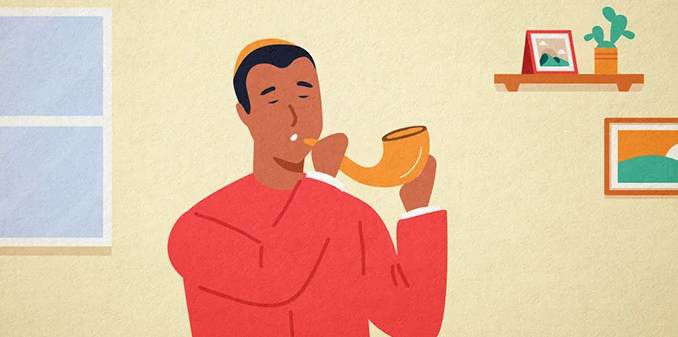If you are planning to spend Rosh Hashanah in isolation, here are some tips and reminders just for you:
1. Priority #1: Hear the Shofar
The shofar is typically sounded as part of the daytime Rosh Hashanah service. Even if you cannot attend communal services, you are still obligated to hear 30 blasts of the shofar. Here’s how:
Request a House Call: If you live within walking distance of your closest Chabad rabbi, there is a good chance he will be more than happy to hike over on Rosh Hashanah to blow the shofar for you in a socially distanced manner.
Street Shofar: In many urban areas, where there is a significant Jewish population, rabbis and volunteers will be blowing shofar on pre-designated wide-open spots for the benefit of anyone who needs. Check with your rabbi to see if there will be a shofar-blowing near you.
Toot Your Own Horn: Blowing shofar is not as hard as it may seem at first. Order a good shofar online, brush up on the laws of shofar blowing, and be your own shofar-blower this Rosh Hashanah. Extra credit: Let your Jewish neighbors know in advance, so that they can open their windows and hear your shofar blasts as well.
Watch: How to Blow Shofar @ Home
Print: Shofar Blessings and Procedure (PDF)
2. Prepare to Be Your Own Cantor
Most of the lengthy additions to the prayer services are found in the Chazzan’s repetition to the Amidah (silent prayer), which is not said when praying alone. The best way to get yourself up to snuff for praying alone on Rosh Hashanah is to have a Machzor (Rosh Hashanah prayer-book) handy, and simply follow the instructions, omitting the parts that cannot be done alone, principally the Barechu call to prayer, Kaddish, the Repetition of the Amidah, and the Torah reading service. The main differences are that the middle part of the Amidah is replaced with a Rosh Hashanah text, and that we blow shofar.
Even without the benefit of a minyan, you should still read through the Torah reading of the day, and hearing the shofar is an absolute must.
And remember: G?d is everywhere and hears our sincere prayers wherever we are. We can be sure that if we must stay home, that is exactly where He wants to hear us.
Brush up on the Rosh Hashanah prayers
Print: Machzor Companion for Rosh Hashanah (PDF)
3. Shop, Cook, and Bake Up a Storm
Rosh Hashanah meals are replete with symbolic and sweet delicacies. We eat raisin-studded round challah loaves at all our meals, and dip it into honey for added sweetness. On the first night, right after we break bread, we enjoy apples dipped in honey, pomegranate seeds, the head of a fish (or a ram), and other sweets like carrot tzimmes. On the second night, we make sure to have a “new” fruit, which we have not yet eaten this season, right after Kiddush.
You aren’t in the habit of making small quantities? Great. Pack up the surplus, and drop off your sweet surprise on the doorsteps of fellow quarantiners.
And when you eat your apple in honey, be sure to put an extra little oomph into your prayer that G?d, “renew for us a good and sweet year.” He knows we can use it!
4. Make Lots of Pre-Holiday Calls
It’s customary to extend wishes for a shanah tovah (a good year) to friends, relatives and acquaintances. If you will not be seeing people during the holiday itself, call them on the phone in the preceding days to express your felicitations and to let them know that you will be thinking of them. Fill your social tank to the fullest, and use that fuel to propel you through to Havdalah.
5. Print Out Essential Information Before the Holiday Begins
Having the information you need on hand is more important than ever on Shabbat and Jewish holidays, when we do not use technology. So make sure to print the Rosh Hashanah calendar, as well as the times for candle-lighting and havdalah while you can.
6. Do a Pruzbul at Home
This incoming Jewish year (5782) is a shemitah (sabbatical) year, when all ordinary loans are forgiven. The sages provided a way to still collect them by “giving them over” to a beit din (Jewish court of law). If you are unable to appear before a court in person this year, do so online before Rosh Hashanah. It takes just a minute.
7. Light Yom Tov Candles
Before the onset of the holiday on Monday afternoon and once again after night has fallen on Tuesday night (from a pre-existing flame), we light festive candles to usher in the holiday. Whether they will be overlooking a grand ballroom, or sitting on a table set for one, our holiday candles bring sacred light and a festive glow to our holiday dinners.
8. Hike to Tashlich
On the first day of Rosh Hashanah walk to a body of water and perform Tashlich, a short prayer in which we ask G?d to “cast our sins into the sea.” Held outside and not requiring a minyan, this is the ultimate social-distancing ritual. If you can do so safely, take a leisurely stroll and enjoy waving to friends and acquaintances at the pond as well. If this cannot work for you, you may do tashlich at a later time, until Hoshanah Rabbah, the last day of Sukkot.
9. Say Lots of Psalms
In Chassidic tradition, every unoccupied minute of Rosh Hashanah is to be used for reading Psalms (Tehillim). With extra down time at home, you can make this the year that you say more Psalms than ever before, possibly even finishing the entire 150-chapter book.

